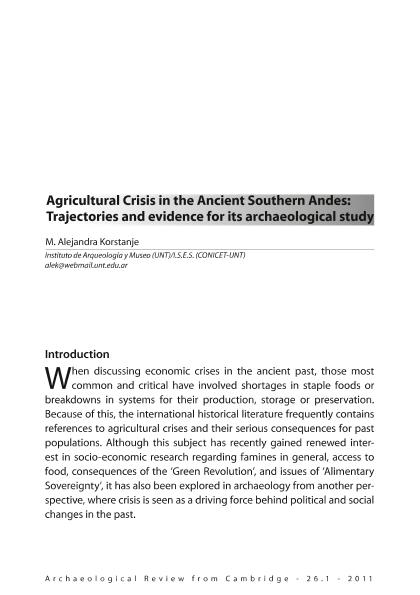Mostrar el registro sencillo del ítem
dc.contributor.author
Korstanje, María Alejandra

dc.date.available
2021-09-30T15:22:44Z
dc.date.issued
2011-04
dc.identifier.citation
Korstanje, María Alejandra; Agricultural crisis in the ancient Southern Andes: Trajectories and Evidence for its Archaeological Study; Cambridge University Press; Archaeological Review from Cambridge; 26; 1; 4-2011; 23-36
dc.identifier.issn
0261-4332
dc.identifier.uri
http://hdl.handle.net/11336/142103
dc.description.abstract
When discussing economic crises, we could say that in the ancient past, those most common and critical have involved the lack of staple foods and/or the spices used for their preservation. Because of this, the literature on world history frequently contains references to agricultural crises and their serious consequences for past populations. Although this subject has recently gained renewed interest in socio-economic research regarding famines in general, access to food, consequences of the "Green Revolution", and issues of “Alimentary Sovereignty”, it has also been explored in archaeology from another perspective, as a driver of political and social changes in the past. Beginning with a review of types of agricultural crises, we will then focus on pre-hispanic and colonial situations from the South-Central and Meridional Andes. In these regions, recent research involving agriculture and ancient peasant life has brought back the inspiration that had been lost since the political repression of Marxist thought in South American archaeology in the late 1970´s. As part of this revival of agricultural studies it has been necessary to reconstruct the subject’s cognitive fabric, including research on basic factors of agrarian systems, such as infrastructure and technology. In this paper I critically examine agricultural crises as a subject that integrates space, technology, and society in their archaeological and methodological manifestations. My goal is to combine the results of archaeological investigations of ancient agriculture, including technological and multi-proxy paleoclimatic aspects, with the social dimensions of economy, in order to develop a non-technocentric theory of ancient Andean staple food production. I introduce specific case studies from North-western Argentina, where archaeologists have begun to interpret the agricultural environment, with in-depth studies of architecture remains, soils and artefacts associated with agricultural practices. As a further step I have started to define the social actors of each process from archaeological evidence as well as from Andean historical and ethnographic sources.
dc.format
application/pdf
dc.language.iso
eng
dc.publisher
Cambridge University Press
dc.rights
info:eu-repo/semantics/openAccess
dc.rights.uri
https://creativecommons.org/licenses/by-nc-sa/2.5/ar/
dc.subject
AGRICULTURA
dc.subject
CRISIS ECONOMICAS
dc.subject
M ETODOLOGIA ARQUEOLOGICA
dc.subject.classification
Arqueología

dc.subject.classification
Historia y Arqueología

dc.subject.classification
HUMANIDADES

dc.title
Agricultural crisis in the ancient Southern Andes: Trajectories and Evidence for its Archaeological Study
dc.type
info:eu-repo/semantics/article
dc.type
info:ar-repo/semantics/artículo
dc.type
info:eu-repo/semantics/publishedVersion
dc.date.updated
2021-09-09T16:44:40Z
dc.journal.volume
26
dc.journal.number
1
dc.journal.pagination
23-36
dc.journal.pais
Reino Unido

dc.journal.ciudad
Cambridge
dc.description.fil
Fil: Korstanje, María Alejandra. Consejo Nacional de Investigaciones Científicas y Técnicas. Centro Científico Tecnológico Conicet - Tucumán. Instituto Superior de Estudios Sociales. Universidad Nacional de Tucumán. Instituto Superior de Estudios Sociales; Argentina. Universidad Nacional de Tucumán. Facultad de Ciencias Naturales e Instituto Miguel Lillo. Instituto de Arqueología y Museo; Argentina
dc.journal.title
Archaeological Review from Cambridge
dc.relation.alternativeid
info:eu-repo/semantics/altIdentifier/url/https://arc.soc.srcf.net/issues/issue26-1.html
Archivos asociados
